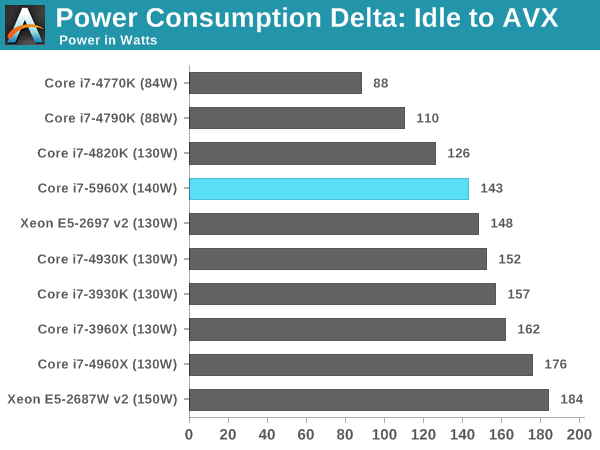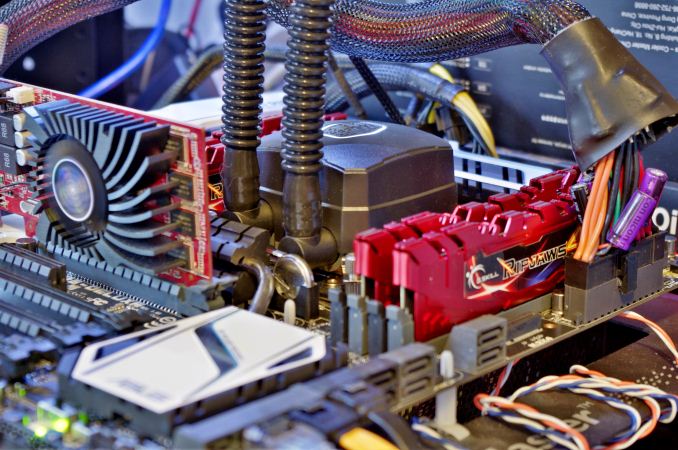The Intel Haswell-E CPU Review: Core i7-5960X, i7-5930K and i7-5820K Tested
by Ian Cutress on August 29, 2014 12:00 PM ESTLoad Delta Power Consumption
Power consumption was tested on the system while in a single MSI GTX 770 Lightning GPU configuration with a wall meter connected to the OCZ 1250W power supply. This power supply is Gold rated, and as I am in the UK on a 230-240 V supply, leads to ~75% efficiency under 50W and 90%+ efficiency at 250W, suitable for both idle and multi-GPU loading. This method of power reading allows us to compare the power management of the UEFI and the board to supply components with power under load, and includes typical PSU losses due to efficiency.
We take the power delta difference between idle and load as our tested value, giving an indication of the power increase from the CPU when placed under stress. Unfortuantely we were not in a position to test the power consumption for the two 6-core CPUs due to the timing of testing.

Because not all processors of the same designation leave the Intel fabs with the same stock voltages, there can be a mild variation and the TDP given on each CPU is understandably an absolute stock limit. Due to power supply efficiencies, we get higher results than TDP, but the more interesting results are the comparisons. The 5960X is coming across as more efficient than Sandy Bridge-E and Ivy Bridge-E, including the 130W Ivy Bridge-E Xeon.
Test Setup
| Test Setup | ||||
| Processor |
Intel Core i7-5820K Intel Core i7-5930K Intel Core i7-5960X |
6C/12T 6C/12T 8C/16T |
3.3 GHz / 3.6 GHz 3.5 GHz / 3.7 GHz 3.0 GHz / 3.5 GHz |
|
| Motherboard |
ASUS X99 Deluxe ASRock X99 Extreme4 |
|||
| Cooling |
Corsair H80i Cooler Master Nepton 140XL |
|||
| Power Supply |
OCZ 1250W Gold ZX Series Corsair AX1200i Platinum PSU |
1250W 1200W |
80 PLUS Gold 80 PLUS Platinum |
|
| Memory |
Corsair 4x8 GB G.Skill Ripjaws4 |
DDR4-2133 DDR4-2133 |
15-15-15 1.2V 15-15-15 1.2V |
|
| Memory Settings | JEDEC | |||
| Video Cards | MSI GTX 770 Lightning 2GB (1150/1202 Boost) | |||
| Video Drivers | NVIDIA Drivers 337.88 | |||
| Hard Drive | OCZ Vertex 3 | |||
| Optical Drive | LG GH22NS50 | |||
| Case | Open Test Bed | |||
| Operating System | Windows 7 64-bit SP1 | |||
| USB 2/3 Testing | OCZ Vertex 3 240GB with SATA->USB Adaptor | |||
Many thanks to...
We must thank the following companies for kindly providing hardware for our test bed:
Thank you to OCZ for providing us with PSUs and SSDs.
Thank you to G.Skill for providing us with memory.
Thank you to Corsair for providing us with an AX1200i PSU and a Corsair H80i CLC.
Thank you to MSI for providing us with the NVIDIA GTX 770 Lightning GPUs.
Thank you to Rosewill for providing us with PSUs and RK-9100 keyboards.
Thank you to ASRock for providing us with some IO testing kit.
Thank you to Cooler Master for providing us with Nepton 140XL CLCs and JAS minis.
A quick word to the manufacturers who sent us the extra testing kit for review, including G.Skill’s Ripjaws 4 DDR4-2133 CL15, Corsair for similar modules, and Cooler Master for the Nepton 140XL CLCs. We will be reviewing the DDR4 modules in due course, including Corsair's new extreme DDR4-3200 kit, but we have already tested the Nepton 140XL in a big 14-way CLC roundup. Read about it here.











203 Comments
View All Comments
tuxfool - Saturday, August 30, 2014 - link
I'm not so sure it would be of great benefit. Emulators are thread limited by the hardware they're attempting to emulate. I read somewhere that pcsx has a thread limit due to the difficulty in synchronizing each ps2 hardware component in each thread.Dolphin also favors clock speed over simultaneous threads.
bleh0 - Saturday, August 30, 2014 - link
After holding off for 4 years I think it is time for an upgrade. While the builds in the article are good I'm still looking for more.chizow - Saturday, August 30, 2014 - link
Glad I upgraded to Z87+4770K last year. While it is great that Intel *FINALLY* upgraded the rest of their platform to native USB 3.0 and all SATA3 (6G) ports, along with newer options like M.2 and SATA Express, the drop in clocks to accommodate the higher number of cores and higher resultant TDP makes it a wash for my primary purpose: gaming.I also didn't want to have to pay early adopters tax on DDR4, and it looks like that tax is high right now. Coming from X58, I was also very pleased with the drop in total system power going to Z87. I'd estimate between a 920@4GHz and the difference in board power, its pulling about 50W less at idle and 100W less under load. My Kill-A-Watt measurements indicate similar.
Still, if buying today and putting together a new platform for the future, this would be a good option now that Intel has addressed all of the major issues I had with the X79 platform (full native USB 3.0, full native SATA6G, official PCIe 3.0 etc).
@Ian, I am sure it is due to being limited to what you have on hand, but it would have been nice to see some more powerful GPUs tested, just to better illustrate potential CPU performance differences once the GPU bottleneck is lifted. Nice job though, the new graph toggles are really slick.
AsakuraZero - Saturday, August 30, 2014 - link
i was worried about this new processors since i just bought an i7 4770k, and damn im still a happy owner of an amazing chipTEAMSWITCHER - Saturday, August 30, 2014 - link
I pulled the trigger on the 4770K last year also....but I did so only because the Ivy Bridge E was stuck on the X79 chipset. For me, it was an interim solution while I waited for Haswell-E. When my new X99 parts arrive next week, I'll upgrade my system and put the Haswell parts on craigslist - I should be able to sell them for a bargain price and reclaim some cash.AsakuraZero - Sunday, August 31, 2014 - link
the 4770k still sells well on ebay i got mine at 270 (used) looked like new and works likea champ, Haswell e doesnt look bad but in a world where the x86 doesnt use all the cores on many of its applications, or gaming im happy with my purchase, enjoy your CPU and milk every buck out of it!Jonathan_Rung - Saturday, August 30, 2014 - link
"With Haswell LGA1150 CPUs, while the turbo frequency of the i7-4770K was 3.9 GHz, some CPUs barely managed 4.2 GHz for a 24/7 system."I think I spotted a little typo on page 3, did you mean "With Haswell z87..."? I didn't think any of the 4770x CPUs could use an 1150 socket. Or am I misreading it?
Mr Perfect - Saturday, August 30, 2014 - link
The Haswell i7-4770k is socket 1150.http://www.newegg.com/Product/Product.aspx?Item=N8...
Jonathan_Rung - Saturday, August 30, 2014 - link
Oh, you're right. I guess I'm confusing sockets and chipsets. Obviously CPUs need a matching socket, but do they also need a matching chipset, or do newer motherboards just allow newer feature sets introduced by the cpu? Or am I still getting it wrong?It seems like every time a new generation of CPUs are released, a bunch of new motherboards with identical chipsets show up to compliment them, so I thought each generation of CPUs have matching chipset that need to pair with one another.
Sorry, this is like amateur hour, I'll just google this stuff. It's strange, I like reading these articles, but I haven't the slightest idea why - I only understand what they're saying like half of the time!
mcbowler - Saturday, August 30, 2014 - link
at least my dolphin rating is still on top! not sure why that is important.